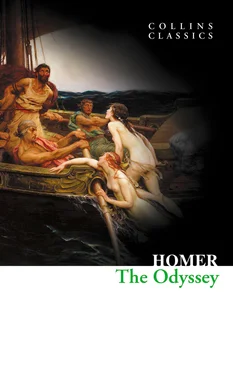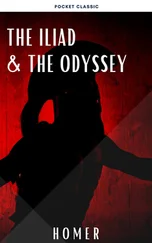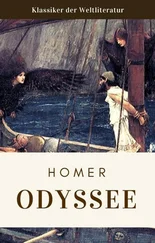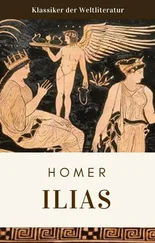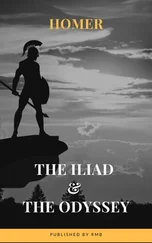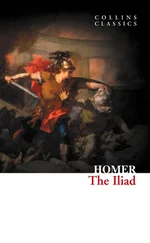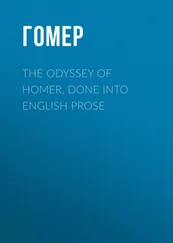1 ...7 8 9 11 12 13 ...23 ‘Learn from this, my friend, not to wander from your home for too long, abandoning your property, when there are men rampaging in the house likely to share out and consume all you have: for so you would find your journey to have defeated itself. Yet I exhort, nay I order, you to visit Menelaus who has so newly come home from abroad, from parts so foreign that the stoutest-hearted would despair of ever returning thence when once driven distractedly by storms across that fearful, boundless sea: a sea so vast and dread that not even in a twelvemonth could a bird hope to wing its way out of it.
‘Wherefore I would have you visit him, sailing in your own ship with your crew: but if you prefer the road, a chariot and team are at your disposal, with my own sons to guide you to tawny Menelaus, in Lacedaemon the fair. Make your appeal to him with your own lips, for then he will heed and answer truthfully out of his stored wisdom, not thinking to play you false.’
There Nestor ceased: but now the sun was going down and the shadows deepening. So to the company spoke the goddess, grey-eyed Athene. ‘Ancient, right well have you told us your tale: but it is time to cut the tongues and mix the wine, that we may complete our offerings to Poseidon and the other immortals: and then must we think of our couches: for it is bedtime. The sun has sunken into the shadow of the world and we should be going, lest we sit unmannerly long at the table of the Gods.’
Her audience approved her. The henchmen poured water on their hands and the serving-boys filled the drinking bowls to the brims with compounded drinks. Then they served round to each a fresh cup. The ox-tongues were cast into the fire, and rising to his feet each man poured his libation in turn. After they had so offered and had drunk of what was left all their hearts’ desire, then Athene and godlike Telemachus would have been going back together to their hollow ship: but Nestor stayed them with words of protest: –
‘May Zeus and the whole company of the immortals deliver me from your passing by my house, to slight it and sleep in your ship, as if I were a naked, needy man who had at home neither cloaks nor coverlets for the soft sleeping of himself and his guests! Praise be, I have great store of bedding. Never, I swear, while I live shall the beloved son of my comrade Odysseus lie out on the bare boards of his vessel – nor while there are children of mine left in the palace to entertain whatever guests may come under its roof.’
Athene replied, ‘Well said, old friend: and Telemachus will do your bidding, as is most fit. Let him even now go with you to sleep in your palace. But my duty is to order and hearten the crew of our black ship by returning to them with our news. You see I am the one man of years in the party. All the rest are young men, fellows in age of stout Telemachus, and they have come with us on this trip for love’s sake. Therefore with them I sleep this night through, beside the black shell of the ship: and in the morning I shall push on to the estimable Cauconians, who for no small while have owed me no small sum. Meanwhile let it be your care to send Telemachus, your guest, forward with one of your sons in one of your fast chariots: choosing for him from out your stud two of the lightest footed and deepest chested horses.’
The goddess ended her say, and took flight from them, in the way of a sea-eagle. Astonishment fell on all present and the venerable man was awed at what his eyes saw. He seized Telemachus by the hand, crying his name and saying: ‘Friend Telemachus, what fear could one have of your growing up weak or base, when from your youth gods walk with you as guides? Of the great dwellers on Olympus this can be no other than the Daughter of Zeus himself: the Tritonian, the All-glorious: who also was wont to single out your great father for honour, from among the Argives.
‘O QUEEN, I pray you, be gracious unto us, and bestow upon me a goodly repute amongst men; for me, and my sons, and for the wife I love and honour. And I vow to you a yearling heifer, broad-browed, uncovered, and never yet subjected to the yoke of man. This beast will I sacrifice to you, after I have caused her horns to be covered with pure gold.’
Such was the prayer that he uttered, and Pallas Athene heard him.
Then did Nestor, Gerenia’s knight, lead into the fair hall his sons and his sons-in-law; who there in the palace of that most famous sire sat them down, orderly, each on his seat or throne: while the old lord mixed for his visitors a cup of wine which had mellowed eleven years in its jar before the good-wife broke the sealed wrappings and poured it forth. With such drink did the old man have his cup blended: and he poured the first of it to Athene, praying fervently the while to her, the daughter of aegis-bearing Zeus.
The others again made their drink-offering, and drank till their hearts were satisfied. Then the company dispersed, each to his own quarters in search of sleep: but for Telemachus, godlike Odysseus’ son, Nestor the Gerenian horselover had coverlets spread on an inlaid bedstead in the coved entry of the house, under its reverberant roof. For company there was Peisistratus with his good ashen spear: Peisistratus, though a tall man who led his rank in the battle, was yet unmarried, and so, alone of the sons, kept his father’s house. The old lord slept apart in the depths of the great building, where his lady wife had made ready their couch and its coverings.
Day-break: and the rosy-tinted fingers of dawn crept up the sky. Nestor, knight of Gerenia, left his bed and came forth to sit before the lofty gateway of his house on the smooth platform there built. Its white stones, all smoothly polished, had been the old-time seat of Neleus, that divinely-unerring counsellor, long since subdued by Death, who had gone down to Hades leaving Nestor as warden of the Achaeans to sit in his place and wield his sceptre of power. About him gathered the cluster of his sons, coming from their private houses: Echephron and Stratius and Perseus and Aretus and magnificent Thrasymedes. Also the sixth son, brave Peisistratus came: and they brought goodly Telemachus too, and set him there amongst themselves as Nestor began to address them:
‘Quickly, quickly, dear sons, do my bidding, that I may single out from all the gods for reverence, divine Athene, who visited me in the flesh yesterday at the God’s solemn feast. Let one of you, therefore, run to the pastures for a heifer to be brought as quickly as the neat-herd can drive her here. Let another hasten to the black ship of largehearted Telemachus and bring up all his company save two. Let some one else bid Laerkes the gilder come, to lap in gold the horns of the victim. The rest of you stay in the house to see that its women busy themselves, laying the tables in our famous hall and arranging seats and a proper provision of fire-wood and sparkling water.’ So Nestor ordered and they ran to obey. The heifer appeared from the fields and the crew of high-hearted Telemachus arrived from their swift and goodly ship: also the smith came, carrying in his hands the tools of his smithying by which his art was manifested – the anvil, the hammer and the shapely tongs to work his gold.
Athene, too, came to accept her sacrifice.
Then did Nestor, the ancient knight, bring out his gold: and the craftsman cunningly overlaid the heifer’s horns in order that the goddess might be glad when she saw the loveliness dedicated to her. Statius and noble Echephron led the beast forward by the horns. Aretos came out from the living rooms, with a lotus-bowl of water for lustration in one hand and the basket of barleymeal in the other. Thrasymedes, strong in battle, stood ready, poising his sharp axe to cut down the heifer. Perseus held the blood-basin.
Venerable Nestor opened the rite of sacrifice by dipping his hands into the water to purify them: then he began to sprinkle the meal, praying earnestly the while to Athene and casting hairs from the forelocks of the heifer into the flame. Then, after they had joined in prayer and in scattering the heave-offering of grain, suddenly the son of Nestor, ardent Thrasymedes, stepped in and struck. His blade cut through the sinews of the neck, and the might of the heifer was undone. The women raised their wavering cry, the prince’s daughters and his daughters-in-law and his honoured wife, Eurydice the eldest daughter of Clymenus: while the men strained up the beast’s head from the trodden earth, that proud Peisistratus might sever her throat.
Читать дальше
